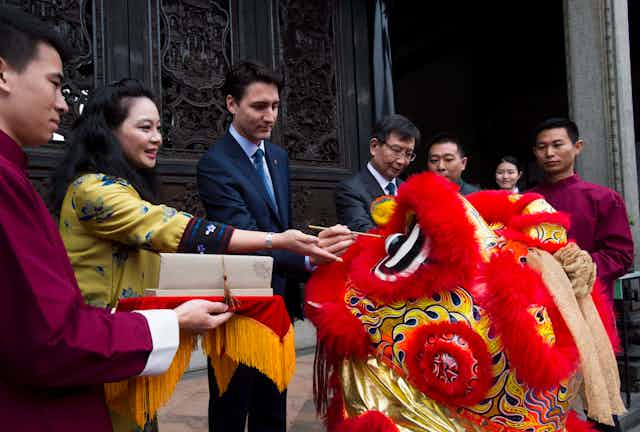According to the Xinhua News Agency, a senior Chinese official had a favourable reception last month when he visited Ottawa to try to reframe the stalled trade talks with Canada.
China’s official state news agency said that Song Tao — who heads the Communist Party Central Committee’s International Liaison Department — briefed Canadian officials on Beijing’s plan to displace the United States as the world’s superpower.
It intends to do so by “building of a community with a shared future for mankind,” which Xinhua added is “not only important to China but bears profound interest for the rest of the world.”

If the Xinhua report is accurate, Canada is blithely considering a Chinese Communist proposal to sell out the liberal values that define global institutions like the United Nations and World Trade Organization in favour of a made-in-China model that will serve Beijing’s authoritarian nationalist aspirations.
It’s time to realize that decisions being made now are going to radically change the values of global diplomacy and justice for the next century or more.
Based on my past experience as a counsellor at the Canadian embassy in Beijing, I argue strongly that Canada needs to seriously rethink its approach to China in order to meet the challenge of China’s rise.
A good start is to recognize the yawning need for regulations that monitor Western civil servants and politicians who, after they retire from government, go into lucrative businesses and consultancies funded by China-related sources.
Conflict of interest?
When former officials enrich themselves with Beijing’s money once they’re no longer managing China-related policy, it raises huge questions about whether they’d been compromised in defending Canada’s national interests vis-à-vis China while in office.
A post-retirement second career, trading on their China-related “friendships” cultivated in government service, is simply not appropriate.
Multi-ethnic nations like Canada should of course encourage citizens of Chinese origin to seek political office — we need legislatures that reflect our diversity.
But the sole legitimate function of a politician is to serve the purposes of their nation of citizenship. Ethnic Chinese politicians with divided loyalties who spend a lot of time in China for vaguely defined purposes should not have a voice in policy-making that might benefit the Chinese Party State in Canada.
And, obviously, Canadian political parties should not be accepting funding from foreign sources, indirectly or otherwise.
Most Western nations’ think tanks that advise on China relations routinely accept funding from PRC-related sources.
And our media often provide an influential platform to apologist pundits whose grants and China travel are on Beijing’s dime through “exchanges.”
Canada must counter Chinese subversion
There’s no doubt Canada urgently needs a lot more expertise on China so we can better realize our interests within that country, but we should pay for it ourselves.
We also need to get more resources to our police and security agencies to counter Chinese subversion. Any accredited diplomat who menaces or harasses people in Canada — including ethnic Chinese democracy activists or members of the Tibetan and Uyghur communities — in ways that are incompatible with their diplomatic status should be declared persona non grata and sent home.
Likewise, Chinese state security agents who enter Canada under false pretenses for the same purposes should be tracked down and criminally charged.
Getting serious about defending against subversion is another important national security concern. Ottawa must expend more energy combating Chinese political, military and economic espionage, and put more resources into identifying people who transfer Canadian secrets and restricted technologies to agents of the Chinese state.
Celebrate democracy
Beyond our own borders, democracy in Taiwan and Hong Kong should be celebrated, but we shun their progressive leaders who share our values because China tells us to — or else.
Canadian leaders should continue to meet with the Dalai Lama periodically, as a legitimate expression of our concern over the situation of Tibetans in China. We must apply our human rights standards equally to all peoples regardless.

Finally, it is shocking that there is even a debate over whether Beijing, through the China Communications Construction Company, should be allowed to purchase Canada’s largest publicly traded construction company, Aecon Group.
This in itself reveals serious flaws in Canada’s China policy. Aecon helped build the CN Tower, Vancouver’s Skytrain, the St. Lawrence Seaway and is about to work on the Darlington nuclear power plant.
The growing public outcry against the sale has led the federal government to announce recently that it will order a full national security review.
But we’ll never know what the review reveals since it will be assessed by cabinet in secret.
If Ottawa, bowing to Chinese government pressure, allows this sale anyway, expect the new version of Aecon to enter unrealistically competitive bids on critical Canadian infrastructure projects.
What’s more? Expect the Chinese military to have the blueprints of all past and future Aecon projects in perpetuity for their own use, or to share with their North Korean allies.
The Aecon purchase is just one small piece, but a large indicator, of a grander, co-ordinated Chinese Communist plan. Let’s come to our senses and just say “no.”

